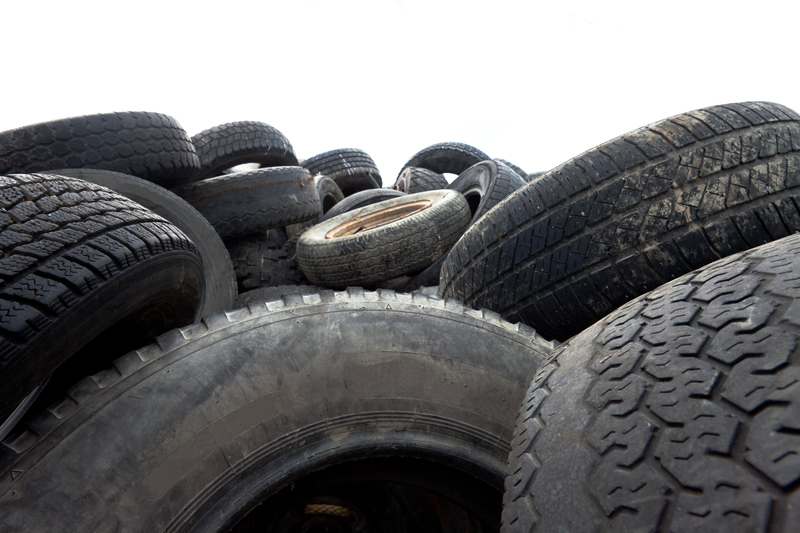Eco-Friendly Methods for Disposing of Your PPE Waste
The global rise in the use of Personal Protective Equipment (PPE) -- such as face masks, gloves, and gowns -- has been essential in protecting public health. However, this sudden surge has also resulted in an alarming increase in PPE waste, much of which ends up in landfills and oceans. With growing environmental concerns, it's crucial to explore eco-friendly methods for disposing of your PPE waste. In this detailed guide, we'll examine innovative, sustainable, and responsible solutions to PPE disposal, and how you can make a positive impact on the planet.
Why Eco-Friendly PPE Disposal Matters
Improper disposal of PPE poses significant threats to both the environment and public health. Here's why eco-friendly PPE waste management is more important than ever:
- Protects wildlife: PPE can entangle or be ingested by marine and terrestrial animals.
- Prevents pollution: Most PPE is made of plastic polymers that persist for centuries, contributing to land and water pollution.
- Reduces carbon footprint: Sustainable disposal processes can help curb greenhouse gas emissions.
By understanding the urgency, we can shift towards greener PPE disposal habits.

Types of PPE Waste and Their Environmental Impact
- Face Masks: Typically made from non-biodegradable polypropylene plastics.
- Gloves: Often rubber or nitrile, which degrade very slowly in the environment.
- Gowns and Aprons: Usually contain synthetic fibers that do not easily decompose.
- Face Shields: Composed of layered plastics and foam which are difficult to recycle.
Improperly discarded PPE clogs waterways, litters landscapes, and introduces toxic substances as it breaks down. As such, exploring eco-friendly PPE waste disposal options is not just preferable but necessary.
Eco-Friendly Methods for Disposing of Your PPE Waste
1. Segregate Your PPE Waste Properly
Begin by separating PPE waste from general household or business waste. This prevents contamination and allows for specialized treatment or recycling. Use marked bins for used masks, gloves, and other protective gear.
2. Seek Out PPE Recycling Programs
Certain local authorities, organizations, and private companies now offer dedicated PPE recycling programs. These initiatives are tailored to process and repurpose non-biodegradable PPE materials. How does it work?
- Collection bins are provided at clinics, offices, and public spaces.
- Items collected are sanitized, sorted, and processed using mechanical or chemical recycling techniques.
- Recycled PPE is then converted into pellets or fibers for manufacturing new products, such as construction materials or park benches.
If your area does not offer this service, communicate with local recycling centers to check for pilot programs or to advocate for their introduction.
3. Compostable and Biodegradable PPE Alternatives
One way to minimize the environmental impact of PPE is to choose products made from compostable or biodegradable materials. Several manufacturers now offer:
- Biodegradable face masks made from natural fibers like cotton, hemp, or bamboo
- Compostable gloves derived from plant-based polymers or latex
Once used, dispose of these products in the appropriate composting streams. Always verify that the PPE is certified compostable to avoid contaminating compost with microplastics.
4. Reusable PPE Options
Wherever safe and feasible, invest in reusable PPE:
- Washable cloth masks: These provide effective protection and drastically reduce single-use waste.
- Reusable gloves and gowns: Designed for multiple uses, especially in healthcare and industrial settings.
Following manufacturer instructions ensures they remain hygienic and functional. By switching to reusable protective equipment, you contribute to waste reduction and environmental protection.
5. Proper Disposal in Hazardous Waste Facilities
For contaminated PPE -- especially from healthcare settings -- designated hazardous waste facilities are essential. Special incineration techniques minimize emissions and ensure pathogens are destroyed.
- Hospitals and laboratories often have contracts with certified disposal companies for infectious waste handling.
- Households generating significant medical PPE waste should consult with local authorities for drop-off times and locations.
Choosing approved hazardous waste routes over the general waste bin upholds health and sustainability.
6. Participate in PPE Take-Back and Mail-Back Programs
Companies such as TerraCycle and specialized recycling services offer PPE take-back programs, including convenient mail-back options for masks and gloves. These programs often function as follows:
- Order a designated PPE recycling box.
- Fill the box with used, non-infectious PPE waste.
- Mail the box to the program for responsible processing and recycling.
Search online for similar schemes in your area, or propose such initiatives to your workplace, school, or local government.
7. Innovative Technologies for PPE Waste Disposal
Cutting-edge solutions are emerging to address the growing challenge of PPE waste. These include:
- Thermal recycling methods: Converting PPE into energy through controlled pyrolysis or gasification processes
- Chemical depolymerization: Breaking down plastics into raw materials for new manufacturing
- Bio-based degradation: Using enzymes or bacteria engineered to decompose synthetic PPE components
Supporting and advocating for these innovations can accelerate sustainable transformation in PPE waste management.
Best Practices to Reduce PPE Waste at the Source
Adopt a Minimalist Approach
- Assess whether you truly require disposable PPE for every situation.
- Implement safe but sustainable alternatives when possible.
Educate and Raise Awareness
Spread the word about eco-friendly PPE disposal methods within your organization, school, or community. Simple actions include:
- Sharing informative posters or digital materials
- Hosting recycling drives
- Connecting with local environmental groups and initiatives
Work with Suppliers
- Choose vendors that provide eco-friendly, biodegradable, or recyclable PPE for your needs.
- Request environmental certifications from your suppliers to ensure transparency and compliance.
Leverage Government or Industry Guidelines
Follow official recommendations for the safe disposal of PPE, as these often prioritize both public health and ecological well-being. Regularly consult updates from agencies such as the Environmental Protection Agency (EPA) or the World Health Organization (WHO).
Frequently Asked Questions: Eco-Friendly PPE Disposal
Can all PPE be recycled?
Not all PPE is recyclable due to mixed materials, contamination, and sanitation requirements. However, specialized programs for processing masks, gloves, and face shields are expanding. Always check with local facilities for accepted items and proper cleaning steps.
What should I do with used masks at home?
If masks aren't recyclable in your city, cut the ear loops to prevent wildlife entanglement and dispose of them in a sealed bag in general waste. Consider reusable masks to minimize single-use waste.
Are biodegradable PPE options effective?
Certified biodegradable masks and gloves can offer substantial protection while breaking down faster in compostable environments. However, effectiveness depends on proper composting facilities and correct disposal.
How do I encourage my workplace to adopt sustainable PPE disposal?
- Present data on environmental impacts.
- Suggest reliable recycling or take-back programs.
- Collaborate with facility management for green waste initiatives.
- Host internal drives and recognition for eco-minded departments.

The Future of Sustainable PPE Waste Management
Awareness of the hazards posed by PPE waste is driving global innovation. Forward-thinking solutions like advanced recycling, plastic alternatives, and green certifications are shaping the next chapter of public safety gear. Here's how you can take part:
- Demand and support eco-friendly PPE from producers.
- Advocate for green infrastructure and recycling programs in your community.
- Stay informed via reputable sources on best disposal practices and new technologies.
Conclusion: Your Role in Eco-Friendly PPE Waste Disposal
Personal Protective Equipment remains an indispensable safeguard for health. But its afterlife need not cost the earth. By adopting eco-friendly methods for PPE waste disposal -- from recycling and composting to sourcing sustainable alternatives and participating in innovative programs -- you become part of the solution to a cleaner, greener future.
Remember, every eco-conscious action counts, whether you're an individual, family, workplace, or community. Choose wisely, dispose responsibly, and help protect both people and planet from the unintended hazards of PPE waste.
- Reduce, reuse, and recycle your PPE wherever possible
- Switch to sustainable alternatives and reusable options
- Educate others and support environmental initiatives
Together, let's commit to a future where public health and environmental stewardship go hand in hand.
